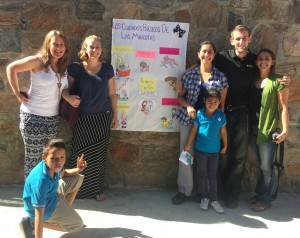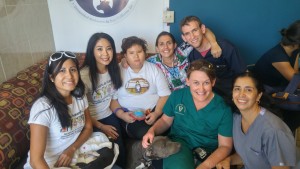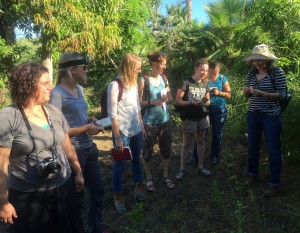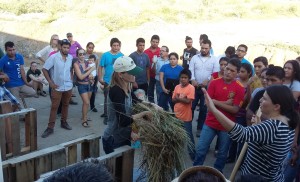People are at the core of the mission of the Colorado State University Center in Todos Santos, Baja California Sur, Mexico.
Less than two years since inception, the CSU Center at Todos Santos has become a unique education and research site for CSU professors and students, a place to create partnerships within the Baja California Sur region, and an opportunity for innovative connections with the local community.
More than 100 students, faculty, and staff from CSU have participated in 24 development research trips and six outreach programs to Todos Santos, since programming began at the Center in October. Nearly 1,200 Baja California Sur community members have engaged in programming at the CSU Center.
Natasha Bolourirad, a student in CSU’s Doctor of Veterinary Medicine Program, finished a 10-day veterinary externship in Todos Santos in November, which included hosting wellness and sterilization clinics with local partners, a workshop with area farmers, and youth outreach and education lessons at Todos Santos primary schools.
“I feel so lucky to have worked with so many locals and to see firsthand how much they appreciated us being there. And yet, I still feel as though we are the ones who are truly lucky to have been welcomed into their hearts and homes,” Bolourirad said. “If I had one word to describe those involved in making this project a reality it would be ‘passionate.’ Everyone I have met along the way has dedicated so much of themselves into the Todos Santos Center and they genuinely care about the local community.”
Cultivating global citizens
Placing students in a learning environment where they can collaborate to create positive global engagement is a passion for Danielle Straatmann, director of International Student Experiences for CVMBS.
Straatmann has worked since February 2014 to create the International Veterinary Experience Program in Todos Santos and has led four cohorts of veterinary students on experiential learning rotations. As a fluent Spanish speaker, Straatmann has developed numerous partnerships and friendships in the local communities.
 “To me it’s the cultural education that is the best part,” Straatmann said. “We’re becoming a global society where we all need to understand each other’s cultures. Being in Todos Santos broadens what we see so we can be a more accepting people.”
“To me it’s the cultural education that is the best part,” Straatmann said. “We’re becoming a global society where we all need to understand each other’s cultures. Being in Todos Santos broadens what we see so we can be a more accepting people.”
Addy Elliott, an instructor in the Department of Soil and Crop Sciences, co-led a sustainable agriculture class to Todos Santos in mid-October to explore regional agricultural practices, and it provided a world-view new to many students.
Experience is everything in this world where information is available quickly and experiences are rare.
“Experience is everything in this world where information is available quickly and experiences are rare. The students developed a strong bond with one another during the trip and a great appreciation for critical thinking,” Elliott said. “I feel like this was a very memorable and powerful experience for each of the students.”
The first semester-long program
In January, Kate Huyvaert, associate professor of Fish, Wildlife, and Conservation Biology, and 15 students will be in Todos Santos for the first semester abroad program for undergraduate majors in her department at the CSU Center at Todos Santos.
As a researcher who has spent more than 20 years doing research and conservation in the Galapagos Islands, Huyvaert appreciates the impact of international opportunities for students, and sees the immense potential in Todos Santos.
 “One of my research interests focuses on the biology and conservation of tropical bird species. Baja California Sur is home to a number of bird species found nowhere else in the world — they are endemic to the region — so BCS could be an exciting place to learn about the evolution and ecology of endemism in another tropical location,” she said.
“One of my research interests focuses on the biology and conservation of tropical bird species. Baja California Sur is home to a number of bird species found nowhere else in the world — they are endemic to the region — so BCS could be an exciting place to learn about the evolution and ecology of endemism in another tropical location,” she said.
“It’s great to see students’ eyes light up when they travel internationally for the first time or swim in the ocean for the first time — these sorts of field experiences broaden students’ horizons and transform their perspectives. Really neat to be a part of that,” Huyvaert said. “Todos Santos and the region are rich with opportunities to learn, grow, and broaden our horizons.”
An international program with integrated research
The CSU Center at Todos Santos provides a unique international experience for students in a wholly-owned CSU facility, providing the opportunity for consistency in classroom setting, continued improvement in programming, and longevity and commitment to the Todos Santos community.
CSU has a strong international portfolio and partnerships. As a new international satellite office the CSU Center at Todos Santos builds on the strong foundation of International engagement at CSU, and creates continued opportunities for international collaboration and interdisciplinary research.
“The Center provides a hub through which faculty, students, and regional partners can work together over time to apply a transdisciplinary systems thinking approach in order to collaboratively address complex challenges,” said Kim Kita, director of Special Projects and Partnerships at CSU. “These integrated experiential learning and discovery processes build bridges to engage locally for global impact.”
Kathleen Pickering, professor of the Department of Anthropology at CSU, has been engaged in the CSU Center as a researcher and as the university’s former vice provost for undergraduate affairs.
“We’re creating experiential learning opportunities that support student success,” Pickering said.
Augusta Ahlm, a graduate student and graduate assistant in the College of Agricultural Sciences, is one such student. Ahlm has put integrated research to practice in Todos Santos, focusing her master’s research in International Agricultural Extension. She has worked with the sustainable agriculture and anthropology classes, and has taken the opportunity to speak with local leaders and youth about their ideas for the CSU Center.
“My heart lives in Central America. The fact that I can study what I love, in a place I am passionate about is amazing,” Ahlm said. “The Todos Santos Center allows CSU students many valuable learning opportunities. The cultural experience is most obvious. Also, when working in another place it forces students into a cross-disciplinary learning experience.”
Paul Doherty has taught Fish, Wildlife, and Conservation Biology courses at the CSU Center at Todos Santos, and said, “Baja California Sur adds ecosystems – marine, coastal, desert, tropical – and associated wildlife that we do not have in Colorado.”
Elliott agrees.
“During the winter, non-farming months in Colorado it is the peak of production season in Todos Santos,” said the Department of Soil and Crop Sciences instructor.
With more than 20 development research trips so far, an exchange of knowledge and creating opportunities for cross-disciplinary synergy is a University focus with Todos Santos. Yet, equal to an educational exchange, it’s a social and cultural exchange.
“As important as it is for our students to visit Todos Santos, it’s equally important for them to experience the culture,” Straatmann said. “There is so much to be learned on both sides of the border, in Mexico and the United States.”
About the CSU Todos Santos Center
The Colorado State University Todos Santos Center is the university’s first international location and is core to CSU’s mission of teaching, research, service, and outreach.
The Center provides opportunities for CSU students and Baja California Sur residents to collaborate with local partners and businesses to identify needs, conduct research, and produce impactful outcomes.
CSU’s vision in Todos Santos is to cultivate generations of global citizens and to be a part of creating thriving communities through collaboration, experience, and exchange of knowledge in areas such as agriculture, infectious disease, elementary education, environmental and social sustainability, wildlife ecology, veterinary medicine, and public health.
CSU’s outreach and service mission
Core to CSU’s land-grant mission is outreach and service, and as an extension of the university, the CSU Center at Todos Santos is no different. Activities at the center are rooted in CSU’s long-standing values, while building a new model for the future.
“Our commitment to the Todos Santos community and the Baja California Sur region is lasting,” said Amy Parsons, executive vice chancellor of the CSU System. “It’s incredible to have an international education center that aligns so well to the research at CSU, the mission of the university, and that develops our students as open-minded, compassionate global citizens. CSU is filled with dedicated individuals who are partnering with the local community to build a vision from which positive outcomes will emanate.”
In addition to spending months interviewing hundreds of local representatives and compiling cultural assessments, each visit to Todos Santos is an opportunity to deepen the connections.
“Partnerships in the Baja California Sur region are foundational to CSU participation in the region,” said Danielle Straatmann, director of International Student Experiences for CVMBS. “Local partnerships with community programs and members can help guide CSU to know what are important themes for education and the important challenges in the region.”
Current partnerships in the region include:
- Universidad Autónoma de Baja California Sur (UABCS): Memorandum of Understanding with the state school, close ties with the veterinary and animal science programs. UABCS has also had students participate in the Kids Do It All program.
- Centro Municipal de Atencion Canino (CEMAC): The municipal animal shelter has partnered with CSU to create community-based animal health care and surgery events.
- Casa del Estudiante: Working to create positive interactions for the youth.
- Committee for UABCS Extension Campus in Todos Santos: a committee made up of local teachers, youth advocates and politicians. A CSU representative serves on the committee.
Tania Zenteno-Savin, Ph.D., professor at the Centro de Investigaciones Biologicas del Noroeste (CIBNOR), works in the region and is excited to pursue further opportunities with CSU.
“This is the very first time that, as a Mexican, I have found people from another country coming in and actively thinking from the get-go about what the community wants,” Zenteno-Savin said. “They’re asking what we want, not thinking what they want to impose on us, and I think this is a huge point for this project. It’s very rare to go in with that mindset.”
CSU has hosted several community events, such as a composting workshop, a tick information session, and a popular children’s program – Kids Do It All – that brings together local students and Colorado students to create a theatrical performance. Kids Do It All attendance doubled to 45 students, in its second year.
Working with the youth of Todos Santos holds rewarding possibilities, according to Zenteno-Savin.
“The outcome I see is that CSU is leading by example, specifically for the younger kids, high school level, and allows them to see how this project works and how they can get involved in active research that will give them a completely different point of view, and a desire to do something else with their lives,” she said.
Natasha Bolourirad, a student in CSU’s Doctor of Veterinary Medicine Program, can relate to feeling such an impact, as it holds one of her favorite memories.
“It is tough to choose only one experience as every day was a new, life-changing experience,” Bolourirad said. “We made an unexpected stop to a local children’s boarding school to drop off donations of towels, blankets, and toys that we collected. While we were there, one of the children asked what was hanging on my neck (a stethoscope) and I taught her how to listen to my heart with it. I was quickly surrounded by a stampede of children all wanting to hear a heartbeat. I can still remember the look of excitement in each of their eyes; it made me realize that this one experience may have inspired them to know that they too can become a doctor one day.”
Augusta Ahlm, a graduate student and graduate assistant in the College of Agricultural Sciences, had a similar experience during her visit to Todos Santos.
“When I was visiting in October, I visited Casa Del Estudiantes to speak with high school-age youth about their views on agriculture and their hopes for the CSU Center. On a Friday afternoon when students were to be going home for the weekend, I stayed at the center making an open invitation for students to stay and talk,” said Ahlm. “I had 50 students come and spend over five hours to talk with me one by one. I was amazed and honored. How many high school students can you think of that would give up their Friday evening?”
Todos Santos has had such an impact on Ahlm that she’s working with other students to create a CSU Todos Santos student organization, set to be chartered in Spring semester 2016.
“We have witnessed the positive relationships and hard work that has gone into the Center and we believe in the relationship between the Todos Santos community and CSU. These people have put their heart and soul into this project,” Ahlm said. “As Americans we so often forget that we can learn from others who may have a different kind of knowledge and far less resources, but are much more effective and progressive.”